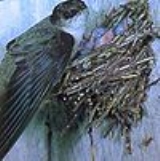
Chaetura
Encyclopedia
Chaetura is a genus of needletail swift
s found in the Americas
in modern times. They resemble in general appearance and are commonly confused with swallow
s but they are not at all closely related to these (see also convergent evolution
). The genus name is derived from the Greek
khaite for long flowing hair and oura for tail, referring to the stiff feathers projecting from the end of the tail.
A fossil
species, Chaetura baconica, was described from Late Miocene
deposits of Hungary
.
Swift
The swifts are a family, Apodidae, of highly aerial birds. They are superficially similar to swallows, but are actually not closely related to passerine species at all; swifts are in the separate order Apodiformes, which they share with hummingbirds...
s found in the Americas
Americas
The Americas, or America , are lands in the Western hemisphere, also known as the New World. In English, the plural form the Americas is often used to refer to the landmasses of North America and South America with their associated islands and regions, while the singular form America is primarily...
in modern times. They resemble in general appearance and are commonly confused with swallow
Swallow
The swallows and martins are a group of passerine birds in the family Hirundinidae which are characterised by their adaptation to aerial feeding...
s but they are not at all closely related to these (see also convergent evolution
Convergent evolution
Convergent evolution describes the acquisition of the same biological trait in unrelated lineages.The wing is a classic example of convergent evolution in action. Although their last common ancestor did not have wings, both birds and bats do, and are capable of powered flight. The wings are...
). The genus name is derived from the Greek
Ancient Greek
Ancient Greek is the stage of the Greek language in the periods spanning the times c. 9th–6th centuries BC, , c. 5th–4th centuries BC , and the c. 3rd century BC – 6th century AD of ancient Greece and the ancient world; being predated in the 2nd millennium BC by Mycenaean Greek...
khaite for long flowing hair and oura for tail, referring to the stiff feathers projecting from the end of the tail.
- Band-rumped SwiftBand-rumped SwiftThe Band-rumped Swift, Chaetura spinicaudus, is a small swift.This species breeds in forested areas from Costa Rica south and east to Colombia, Ecuador, Venezuela, the Guianas, Trinidad and northeast Brazil...
, Chaetura spinicauda - Lesser Antillean SwiftLesser Antillean SwiftThe Lesser Antillean Swift is a species of swift in the Apodidae family.It breeds on Dominica, Guadeloupe, Martinique, Saint Lucia and Saint Vincent. There is a possible record from Nevis....
, Chaetura martinica - Gray-rumped SwiftGray-rumped SwiftThe Grey-rumped Swift, Chaetura cinereiventris, is a small swift.This species breeds in hill forests from Nicaragua south to Peru, Brazil and northern Argentina, and Grenada, Trinidad and Tobago. The nest is a half saucer of twigs glued to the inside of a tree hole, chimney or similar shaded...
, Chaetura cinereiventris - Pale-rumped SwiftPale-rumped SwiftThe Pale-rumped Swift is a species of swift in the Apodidae family.It is found in Bolivia, Brazil, Ecuador, and Peru.Its natural habitat is subtropical or tropical moist lowland forests.-References:...
, Chaetura egregia - Chimney SwiftChimney SwiftThe Chimney Swift is a small bird .-Physical description:In flight, this bird looks like a flying cigar with long slender curved wings. The plumage is a sooty grey-brown; the throat, breast, underwings and rump are paler. They have short tails.-Reproduction:The breeding season of Chimney Swifts is...
, Chaetura pelagica - Vaux's SwiftVaux's SwiftVaux's Swift is a small swift native to North America and northern South America. It was named for the American scientist William Sansom Vaux.-Description:...
, Chaetura vauxi - Chapman's SwiftChapman's SwiftThe Chapman's Swift is a species of swift in the Apodidae family.It is found in Brazil, Colombia, French Guiana, Guyana, Panama, Suriname, Trinidad and Tobago, and Venezuela....
, Chaetura chapmani - Short-tailed SwiftShort-tailed SwiftThe Short-tailed Swift is a bird in the Apodidae, or swift family.-Taxonomy:The subspecies C. b. ocypetes is sometimes considered a full species, the Tumbes Swift Chaetura ocypetes Zimmer, 1953....
, Chaetura brachyura - Ashy-tailed SwiftAshy-tailed SwiftThe Ashy-tailed Swift is a swift which is endemic to northern and central Venezuela.The taxonomy of this group is confusing. The larger and far more widespread Sick's Swift was previously regarded as a subspecies of the Ashy-tailed Swift, but Marín found that Sick's Swift was closer to the...
, Chaetura andrei - Sick's SwiftSick's SwiftThe Sick's Swift is a species of swift in the Apodidae family. It was previously considered conspecific with the smaller Ashy-tailed Swift, but Marín found that Sick's Swift was closer to the Chimney Swift....
, Chaetura meridionalis - Amazonian SwiftAmazonian SwiftThe Mato Grosso Swift , also known as the Amazonian Swift, is a species of swift in the Apodidae family. It is found in Bolivia, Brazil, Colombia, Ecuador and Peru. Its natural habitats are subtropical or tropical moist lowland forests and heavily degraded former forest.-References:* BirdLife...
, Chaetura viridipennis - Costa Rican SwiftCosta Rican SwiftThe Costa Rican Swift is a species of swift in the Apodidae family.It is found in Colombia, Costa Rica, and Panama.Its natural habitat is subtropical or tropical moist lowland forests....
, Chaetura fumosa
A fossil
Fossil
Fossils are the preserved remains or traces of animals , plants, and other organisms from the remote past...
species, Chaetura baconica, was described from Late Miocene
Late Miocene
The Late Miocene is a sub-epoch of the Miocene Epoch made up of two stages. The Tortonian and Messinian stages comprise the Late Miocene sub-epoch....
deposits of Hungary
Hungary
Hungary , officially the Republic of Hungary , is a landlocked country in Central Europe. It is situated in the Carpathian Basin and is bordered by Slovakia to the north, Ukraine and Romania to the east, Serbia and Croatia to the south, Slovenia to the southwest and Austria to the west. The...
.

